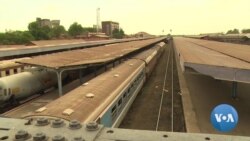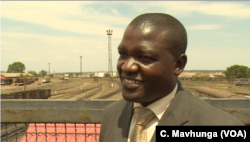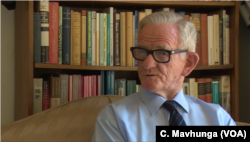President Emmerson Mnangagwa hopes to revive Zimbabwe’s economy by ensuring that state-owned companies stop using tax dollars.
One of those companies is the National Railways of Zimbabwe, which continues to take tax dollars despite several government cash injections.
In the industrial hub of Bulawayo, Zimbabwe’s second biggest city, several industries are closed and unemployment remains high a year after Mnangagwa took power.
In his first address to the nation after wrestling power from Robert Mugabe one year ago, Mnangagwa promised: “Jobs, jobs and jobs.”
Last month, launching the Transitional Stabilization Program to revive Zimbabwe’s economy, Mnangagwa said he wanted all state-owned companies that provided services such as electricity, water and transport, to run efficiently.
The National Railways, with a debt of more than $300 million despite an influx of tax dollars, is one of those expected to turn around. Railways spokesperson Nyasha Maravanyika says that once the company is recapitalized, it will be ready to lead the country’s economic recovery.
“The NRZ (National Railways of Zimbabwe) since 1980 had been a profitable organization until 2001/2002,” Maravanyika said. “That is when we incurred this large debt of over $300 million. We believe that once the NRZ is kicking, once the equipment is recapitalized, the NRZ makes more profits than losses, therefore it will not rely on taxpayers’ money.”
Maravanyika says the railroad’s old equipment, some as much as 100 years old, and mismanagement by the prior administration, are to blame for the losses the organization has been incurring. He says the NRZ is working on getting a cash injection of about $400 million and in about six years should be able to start turning a profit.
Independent economist John Robertson says all parastatals -organizations that serve the state - should be privatized if they are to run efficiently and provide services to Zimbabwe’s economy. He says efforts to bring in investors who want to capitalize the parastatals will not work because they fear the government will not allow them to manage the organizations.
“Privatization is the right mechanism to use, that is, to invite private investors to take over,” Robertson said.
“Government has been reluctant to allow that to happen,” he explained. “They’ve said, we want private investors to come in as partners, not as the people who would now own the enterprise, but government would want to remain in charge, and so they’ve not found many partners willing, on that basis, to come in and to be directed by government when they feel themselves to be the experts in those fields and they do not need that kind of directive from people in government who tend not to be nearly as skilled in those territories as they should be.”
Zimbabwe’s economic crisis has been a major issue for the president. Inflation recently soared to more than 20 percent, its highest level in a decade. When Mnangagwa took office, he promised to improve the long-ailing economy, but some Zimbabweans say little has changed.








